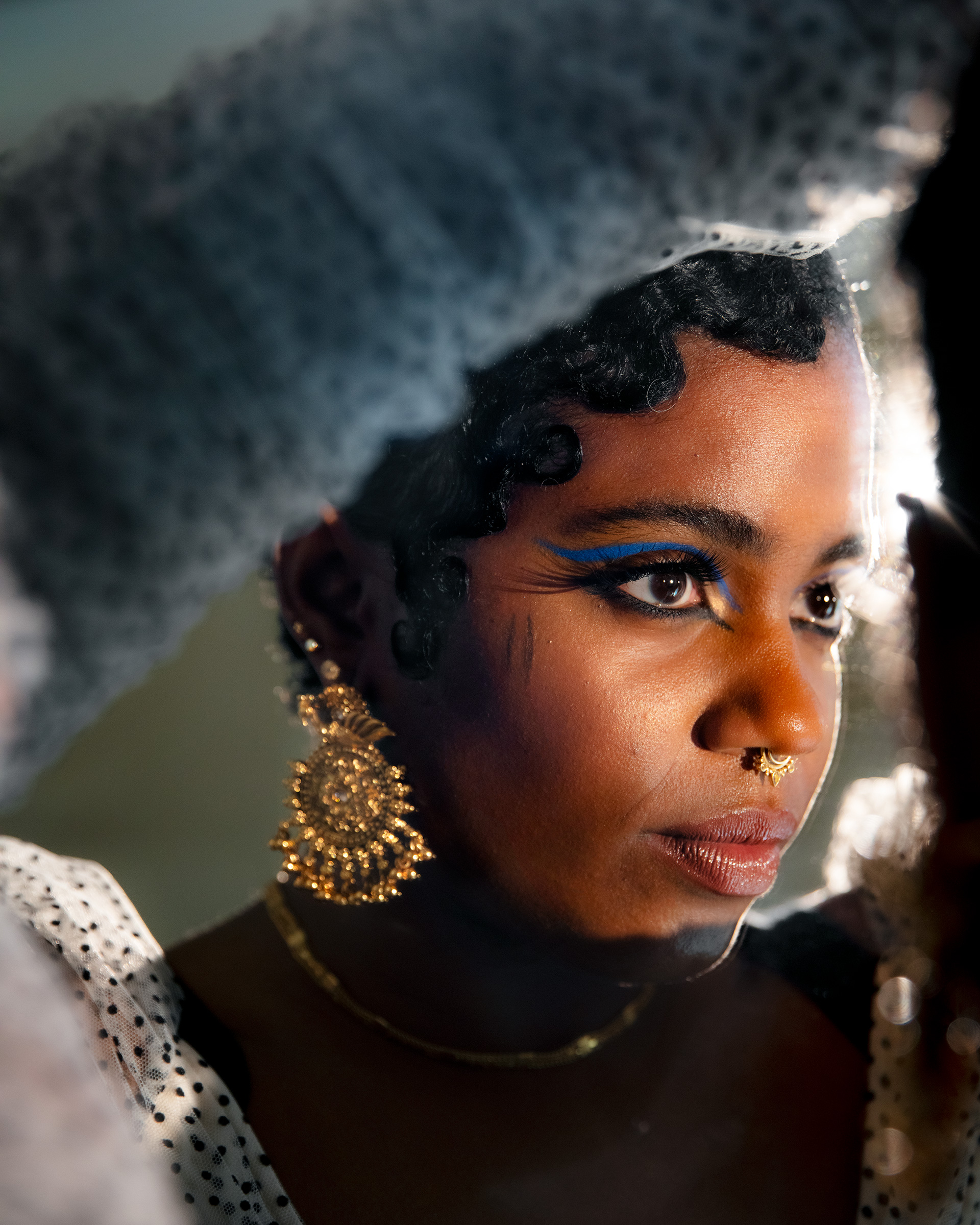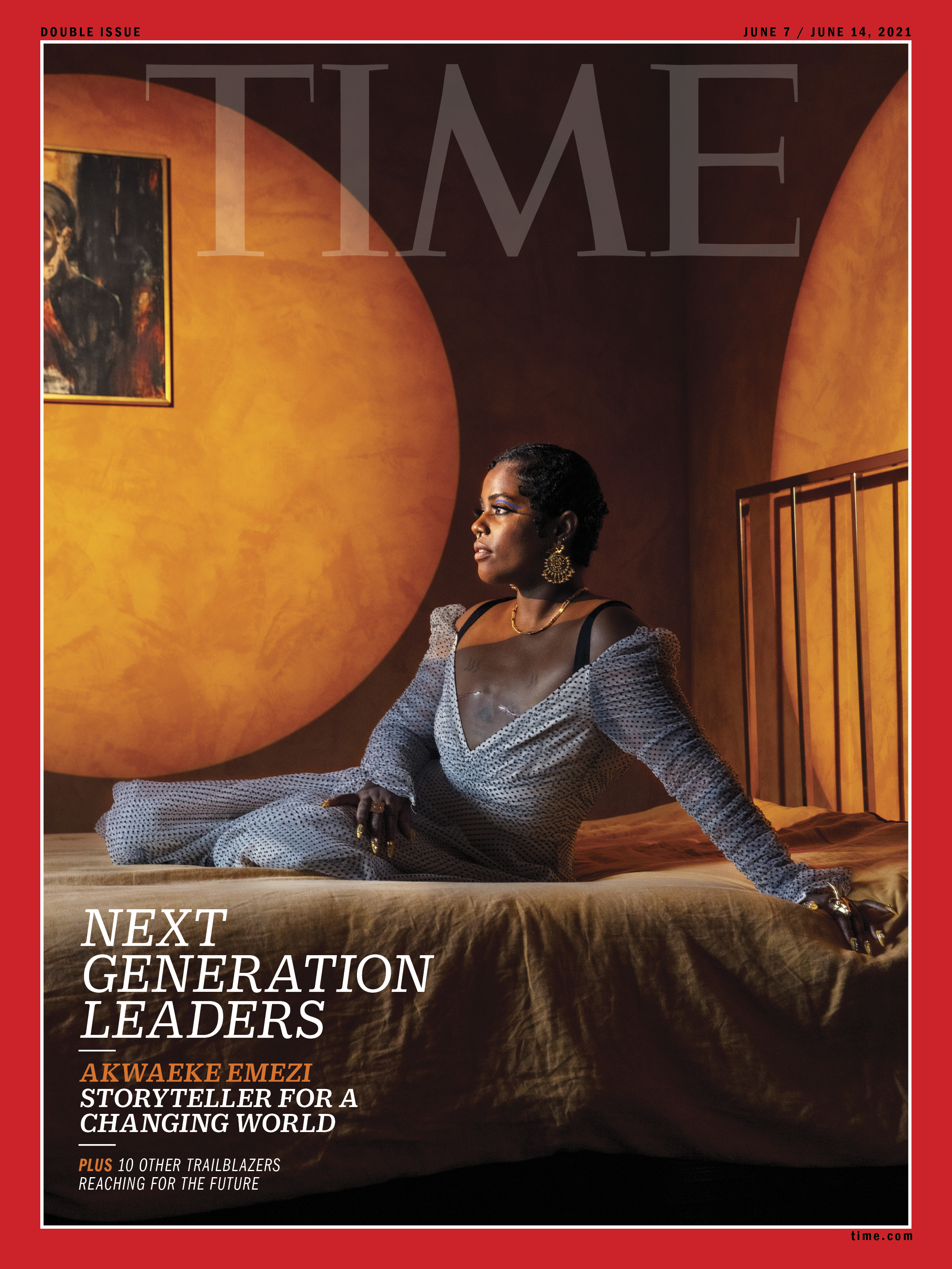Akwaeke Emezi has taken off their masks—the ones we all wear that grin and lie, as poet Paul Laurence Dunbar wrote. The ones that hide and shade more than our cheeks and eyes, camouflaging the traumas we’ve triumphed over. The masks we don to survive a white-supremacist world that simply can’t hold our Black, queer, trans and godly brilliance.
The Nigeria-born, best-selling author of the critically acclaimed Freshwater, PET and The Death of Vivek Oji is simply no longer interested in projecting false versions of themself—even if disengaging with such a survival mechanism comes with costs. After all, true liberation is priceless.
“Just to be able to talk to my own people is freedom,” Emezi says on a recent morning via Zoom, describing the ways writing for white audiences, or rather a publishing industry that centers white readers, is the exact opposite. As a Black author who’s always expressly desired to write for Black people, they’re at a moment in their career where being their most unapologetic and authentic self is not only possible, but also paramount. “I understand all the limitations that are put on us just by existing in this world, by trying to create work in this world, and I’m saying: To hell with that.”
That’s where their latest book, Dear Senthuran: A Black Spirit Memoir, comes in. The viscerally intimate chronicling of Emezi’s lived experience, out June 8, serves as a manifesto marking a shift in their career away from the all-consuming white gaze toward a perspective that is Blacker and more beautiful.
“I’m going to write this as if it’s just us,” they recall telling themself about the memoir, “because in my reality, in my world and in a world where we are free, it is just us.”
Emezi, who turns 34 on June 6, has been world-building since childhood. Growing up in Aba, a commercial town in the south of Nigeria, they were a voracious reader and writer from an early age. They credit such an appetite to the piles of books they had access to, some purchased secondhand at the local post office, some shipped from cousins in London and others found on their parents’ bookshelves. “While the town was burning from the riots,” they write in Dear Senthuran about life under military dictatorship in the ’90s, “my sister and I believed in invisible fairies, pixies hiding in our backyard.”
When they moved to the U.S. at 16, having read everyone from Chinua Achebe to Daphne du Maurier, Emezi was treated as exceptional by white folks. “The white dean of my school kept introducing me as the 16-year-old freshman from West Africa who’d already read Dickens and Tolstoy and Dostoevsky, as if any of that was surprising or special,” they write. But going from a town in Nigeria, where they knew only two or three white people during their entire childhood, to Appalachia, where white people are decidedly the majority, they learned to wear one of their first masks.
“I learned really fast, especially because we were in the South, how to be adorable, how to smile and be really charming [so] that the white people will give you everything,” they say.
Experiencing that in adolescence primed them, somewhat, for the earlier stages of their literary career. Take their 2018 debut, Freshwater, a meditation on metaphysical identity inspired by Emezi’s own life. About a Nigerian girl who, having been born with one foot in the spiritual realm, develops separate selves as she matures, the novel is an accounting of a contemporary ogbanje, a traditional Igbo term that describes a type of trickster spirit born into a human body. Described by Emezi as “technically a memoir” that reflects their own life as an ogbanje, Freshwater was marketed as an “autobiographical novel,” a genre then rising in popularity that Emezi used to make their life more palatable to publishers and readers unfamiliar with Igbo ontology. They figured, as a writer unpublished in the U.S. (they were previously published in the U.K.), that the book would sell easier if readers weren’t asked to accept its story as truth. “I’ll put a mask on this one,” they remember thinking. “And it worked.”
Freshwater was an instant hit, going into its third printing before its publication date because of early buzz, and becoming a New York Times Notable Book for 2018 and a finalist for many honors. Its success made possible the deals Emezi later signed for 2019’s PET, a young-adult novel that centers a Black trans girl and that became a National Book Award finalist, and last year’s The Death of Vivek Oji, an immediate New York Times best seller that details what it means for a family to lose a child they never really knew.
By almost every measure, Emezi has been living a life other writers only dream of. With Dear Senthuran, however, they’re setting the record straight, revealing the depths of depression and anxiety that led to attempts to end their life that happened alongside what they also describe as the “brilliant” blossoming of their career.
Frank and flat-footed, like a soul singer who commands attention without backup dancers and light shows, Dear Senthuran builds upon the narrative of life as an ogbanje first introduced in Freshwater. This time, however, there are no masks. Emezi is refreshingly uninhibited in laying bare the truth of their life as an embodied spirit. They recount everything from their Nigerian upbringing and ongoing issues with their parents to discovering and accepting their innate divinity; from the “bridge across realities” of their gender journey to specifics of their publishing career, including the advances they got for each book and what they stand to make from FX’s series adaptation of Freshwater. The memoir, the first draft of which they finished in December 2019, reflects, as Emezi writes, “the unfolding of a self,” one that once binded, tucked and doubled over into itself to be more legible to others, into the glorious beast they were called to be. Dear Senthuran is a brutally honest and vulnerable testimony of survival, of the rejuvenating variety that inspires and activates; if it had a soundtrack, the timeless Clara Ward gospel hymn “How I Got Over” might be on loop.

“The first words that come to mind are terrifying and lonely,” Emezi responds when asked about the process of unfolding into, or standing in, their power, because “unfolding comes with costs.” Such sacrifices might include falling out of one’s relationship with family or becoming a pariah when one starts taking up for themselves. They use a saying popular in Trinidadian communities that recognizes the sacrifices necessary for liberation: “Yuh cyah play mas if yuh fraid powder.”
“That’s something that I try to remind myself of a lot, that there are costs to unfolding and everyone decides for themselves, is the cost worth it?” they say. The more Emezi unfolds into the truest parts of themself, the more they’ll have to lose and the greater hurt they’ll have to process. Eventually, though, the greater gains they’ll enjoy, too.
Central to Emezi’s standing in their power has been reifying a mantra writer Toni Morrison once espoused. While discussing the massive audience her literary works had attracted in a 1998 interview with journalist Jana Wendt, Morrison said, “I stood at the border, stood at the edge and claimed it as central, claimed it as central and let the rest of the world move over to where I was.” Dear Senthuran is Emezi standing at their center.
The book’s subtitle, A Black Spirit Memoir, was their attempt to ensure that it would not be sold as anything other than what it was. Each chapter is a letter, written to members of Emezi’s chosen family. “I wanted the letters to hold me accountable,” they say, referring to their goal of writing for a Black audience. “I am speaking in the most intimate language I have,” which helps them avoid the code switching and explanatory commas they might’ve once used to ensure “outsiders” could understand.
In writing the book, Emezi says, they wanted to do the opposite of what they learned many years ago in order to traverse white spaces they find themself in. “It was like a survival mask that I put on, where if I seemed harmless then I wouldn’t be hurt or be crushed by the innate white supremacy in all these people,” they say they once thought. But one can’t ever charm their way out of the consequences of white supremacy; the system itself must be dismantled.
Since Emezi’s debut, words like visionary, radical and innovative have been used to describe their work. Perhaps all of these descriptors are true, but Emezi doesn’t see themself necessarily as a leader. Rather, they say they’re a conduit for a collective imagination they make tangible.
“My work is just channeling something that other people gifted me,” they say. For example, they credit the setting for their novel PET—a world without prisons and police—to social-justice organizers and prison abolitionists. “My job in the revolution is as a storyteller, to take those possibilities and shape them into stories [that] disseminate.”
Amplifier, then, is a more apt label for their brilliance, Emezi says, one that requires them “to climb as high as possible and be as bright as possible” so the realities and possibilities they’re amplifying can reach the masses. And they’re set to continue doing this work for the foreseeable future, with two other books slated for release in 2022: a poetry collection titled Content Warning: Everything and a romance novel titled You Made a Fool of Death With Your Beauty, the screen rights of which went for a reported seven figures to Amazon Studios with Michael B. Jordan’s production company, Outlier Society, attached.
“It’s like a spell of possibility we spread,” they say—the possibility of a world better than the one we have. “The more people that believe, the stronger that reality becomes. And our goal is to make that a reality that holds as many people as possible, because the realities we’re living in now, they’re not holding us. They’re trying to kill us.” Emezi’s taking off their mask, then, is also a fight for life, a foreshadowing of a promised land on the horizon.
Anderson is a freelance entertainment and culture journalist and co-host of the podcast FANTI
If you or someone you know may be contemplating suicide, call the National Suicide Prevention Lifeline at 1-800-273-8255 or text HOME to 741741 to reach the Crisis Text Line. In emergencies, call 911, or seek care from a local hospital or mental health provider.

Buy a print of TIME’s Next Generation Leaders cover, featuring Akwaeke Emezi
Cover styled by Akwaeke Emezi; hair by Anastasia Ebel at Baby Bangz; make-up by Tamara Camille Soublet
- The 100 Most Influential People of 2024
- The Revolution of Yulia Navalnaya
- 6 Compliments That Land Every Time
- What's the Deal With the Bitcoin Halving?
- If You're Dating Right Now, You're Brave: Column
- The AI That Could Heal a Divided Internet
- Fallout Is a Brilliant Model for the Future of Video Game Adaptations
- Want Weekly Recs on What to Watch, Read, and More? Sign Up for Worth Your Time